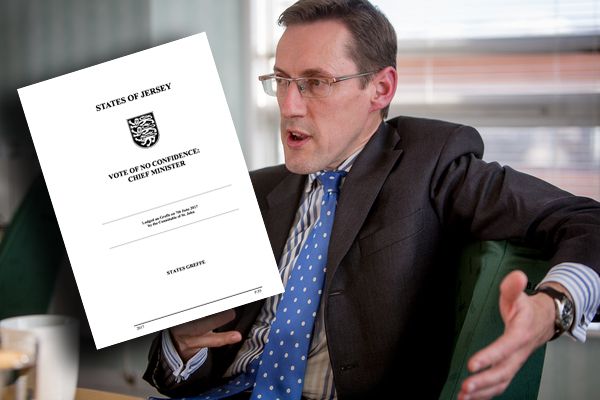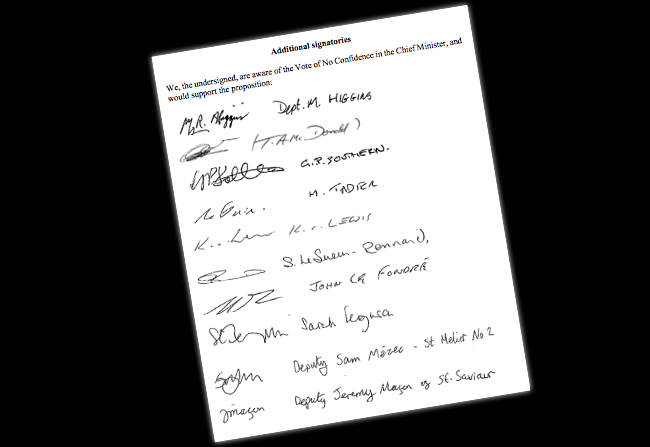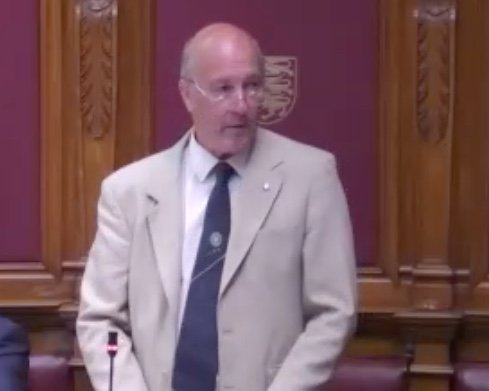

Chief Minister Ian Gorst has survived a vote to oust him from the Island’s top political position.
In an acrimonious day in the States Assembly, Senator Gorst clung on to his role with the support of 34 politicians. 13, meanwhile, voted against.
While the Chief Minister’s position and that of the Ministers remains unchanged, the over six-hour debate allowed politicians to air their ‘dirty laundry’, leaving much to consider by members of all ranks.
If you didn’t get a chance to tune in, here’s the ‘need to know’:
Strong concerns over the hospital funding U-turn, the handling of the Innovation Fund which may have lost over £1 million of public money and – “the railway sleeper that broke the camel’s back” – the reappointment of Senator Ozouf as an Assistant Minister despite his involvement with the failed fund were all “catalysts” cited by Constable Chris Taylor as to why he brought the vote.

Pictured: The States members who put their names to the proposal to eject Gorst.
He managed to convince 13 other politicians to pledge their support in the proposal to remove Senator Gorst from leadership, leading to yesterday’s debate.
Aside from the Constable, the moves to oust Gorst were backed by Senator Sarah Ferguson, Constable Sadie Le Sueur-Rennard, Deputy Geoff Southern, Deputy John Le Fondré, Deputy Kevin Lewis, Deputy Montfort Tadier, Deputy Tracey Vallois, Deputy Michael Higgins, Deputy Jeremy Maçon, Deputy Sam Mézec, Deputy Simon Brée and Deputy Terry McDonald.

Pictured: Members of the States who voted to back Constable Taylor's Vote of No Confidence.
Following a scathing speech, Deputy Judy Martin would have voted that way too, but left before the end of the debate, which extended past 20:00.
Reasons were varied, stretching from historic failures such as the Canbedone film fiasco to more recent difficulties over population control – a consequence of a lack of policy, Constable Taylor claimed.
In a rousing opening speech, the Constable claimed that there had, “…never been a more divided Assembly and we’ve certainly never had a more divided Council of Ministers.” Alongside Deputy Tracey Vallois, he blasted an apparent lack of transparency from the Minister, claiming that Scrutiny had previously had to “summons information – something that’s never happened before” to get to the heart of Ministerial decisions.

"I wouldn't allow him to handle a stag party in a brewery," Constable Taylor said of Senator Gorst's handling of funding for the future hospital.
Metaphors and literary references abounded throughout all speeches, with the Constable accusing Gorst of failing to understand life beyond Cyril Le Marquand House: “When you look at a flower bed, you need to stand back and get the broad picture and take in the whole flowerbed. You don’t go up to the biggest bush and start examining each leaf, each petal in minutia.”
Members of Reform Jersey pointed to persisting social inequality and the treatment of public sector employees as reasons for their discontentment. Deputy Geoff Southern blasted an “accountant mentality”, with Deputy Mézec citing frustrations that the Chief Minister wouldn’t meet union leaders but was “happy to meet with the Institute of Directors and the Chamber of Commerce” instead.
All Reform Jersey deputies will be voting in favour of #GorstVONC. Jersey deserves better.
— Reform Jersey (@ReformJersey) June 20, 2017
Despite not voting against the minister, Deputy Russell Labey and Constable Simon Crowcroft – both St Helier representatives – said that Senator Gorst had discarded the parish as a “strategic priority” as previously claimed, having failed to protect the La Collette green space and not shown support over the Bellozanne battle.
Deputy Tracey Vallois’ analysis’ centred on States HR having reached “crunch point”, with allegations of “bullying and harassment” in the public sector. For Deputy Jeremy Macon, the issue lay with the handling of higher education funding and the slow response to his Scrutiny Panel’s conclusions.
But all were careful to ensure that criticisms were careful to focus on ‘politics not personality’ – the apparent mantra of the day. Reform Jersey’s Deputy Mézec however, argued that, without a party system in place, it could only be one or the other: “We can’t have both.”
While some mightn’t be surprised, the Council of Ministers surrounded the Chief Minister with support, although Deputy Steve Luce – Minister for the Environment – admitted that things hadn’t been plain sailing and that divisions did exist in the Council. Despite this, the self-confessed “critical friend” was adamant that “now is not the time for change” or “instability” within the government, given the upcoming challenges of Brexit.

Pictured: The Council of Ministers backed Gorst and voted against Constable Taylor's proposition.
Many praised his strong work on the UK’s department from the EU, while others suggested that no other person would be able to fulfil the role. In an extended “captain of the ship” speech, Deputy Peter Maclinton demanded that stone-casters instead suggest who should be put forward first before throwing the Chief Minister “to the sharks.”
Deputy Rod Bryans – Education Minister – said that the Chief Minister had earned “full respect” from a wide range of people and praised him for the handling of the “hugely demanding” role. He said that the pair had successfully worked on a number of education initiatives – pupil premium, higher education funding and curriculum reform, to name but a few.
The love-in continued with words of support from Treasury Minister Alan Maclean, Senator Andrew Green, while Constable Juliette Gallichan, who used to sit next to the Chief Minister in the States, humorously spoke of his “passion” and how he would “jiggle” as he felt more strongly about something.

Pictured: States members not part of the council of Ministers who decided to support Gorst.
Gorst, of course, had the opportunity to defend himself, claiming that he would always give 100% and that his successes “did not happen by accident”, including a number of positive strategies spanning disability, mental health, housing, innovation and many more areas on the way.
“I believe in this Island. I believe in our future, but it will not happen by accident. I give, I think, a 100% and I ask members, is that too much? Is that too much? I cannot give less, I cannot give less, nor will I. Don’t ask me to. Our futures are at stake,” he told the Assembly.
Well, no. While 34 supporters might appear a strong mandate, Deputy Russell Labey suggested that the number wishing to see Gorst go may have hit 29 at one point, but, "...a week is a long time in politics" and Senator Ozouf's sacking mere hours before the vote may have been enough to appease the once deafening disquiet.
I am very grateful for the support of Members of @StatesAssembly - I hope we can now work to complete this government's programme of work https://t.co/IIGRiH5uBy
— Senator Ian Gorst (@Ian_Gorst) June 20, 2017
The debate was lauded as a “healthy day for democracy” and opportunity to get concerns out in the open and hold the Chief Minister to account. No doubt much will provide food for thought going forward, with the Chief Minister proclaiming that he would be keen to continue the dialogue he began with backbenchers initiated by the vote.
Comments
Comments on this story express the views of the commentator only, not Bailiwick Publishing. We are unable to guarantee the accuracy of any of those comments.